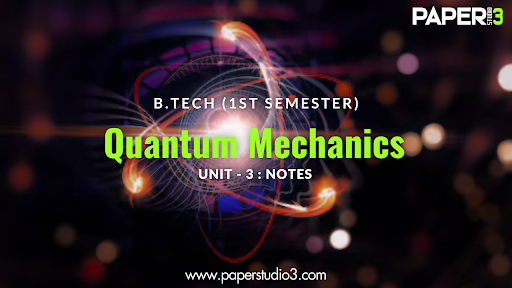Quantum mechanics is a fundamental theory in engineering physics that describes the behavior of particles at the atomic and subatomic scales. It revolutionized our understanding of nature, providing a framework to explain phenomena that classical physics couldn't account for. Here are some key points about quantum mechanics:
- Quantization of Energy: Quantum mechanics introduced the concept of energy quantization, stating that energy is quantized into discrete levels rather than being continuous. This led to the understanding that electrons in atoms exist in specific energy levels or orbitals, and transitions between these levels result in the emission or absorption of discrete packets of energy called photons.
- Wave-Particle Duality: One of the fundamental principles of quantum mechanics is the wave-particle duality, which states that particles can exhibit both wave-like and particle-like properties. This duality is exemplified by the famous double-slit experiment, where particles such as electrons or photons can behave as both particles and waves, showing interference and diffraction patterns.
- Uncertainty Principle: The uncertainty principle, formulated by Werner Heisenberg, states that there is a fundamental limit to the precision with which certain pairs of physical properties, such as position and momentum, can be simultaneously known. This principle highlights the inherent probabilistic nature of quantum mechanics and places limitations on the measurement of certain properties of particles.
- Superposition and Quantum States: Quantum mechanics allows for the existence of superposition, where particles can exist in multiple states simultaneously. The concept of a quantum state describes the complete set of properties that characterizes a particle or system, and the evolution of these states is governed by mathematical equations known as wave functions.
- Quantum Entanglement: Quantum entanglement is a phenomenon where two or more particles become correlated in such a way that the state of one particle is instantaneously related to the state of another, regardless of the distance between them. This non-local connection has implications for quantum information processing and quantum communication.
- Quantum Mechanics in Electronics: Quantum mechanics is essential in understanding the behavior of electronic devices at the nanoscale. It forms the basis for the operation of quantum devices such as transistors, quantum dots, and quantum computers. It also plays a crucial role in the development of technologies like semiconductor devices, lasers, and photonic devices.
- Quantum Mechanics and Materials Science: Quantum mechanics is crucial in materials science, where it helps explain phenomena such as electronic band structure, conductivity, and the behavior of materials under different conditions. Understanding quantum mechanical principles is essential in designing new materials with specific properties for various applications.
- Quantum Mechanics and Quantum Field Theory: Quantum mechanics is a foundation for more advanced theories, such as quantum field theory, which extends the principles of quantum mechanics to include fields and their interactions. Quantum field theory is the basis for understanding fundamental forces, including quantum electrodynamics (QED) and the electroweak and strong nuclear forces.
Quantum mechanics is a cornerstone of modern physics and has profound implications for technology and engineering. Its principles and concepts are crucial for various applications, ranging from electronics and materials science to quantum information processing and advanced theoretical physics.






